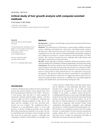 102 citations,
July 2007 in “Genes & Development”
102 citations,
July 2007 in “Genes & Development” A mother's PPARγ is crucial for preventing harmful milk that can cause inflammation and growth problems in babies.
 34 citations,
October 1982 in “Journal of applied polymer science”
34 citations,
October 1982 in “Journal of applied polymer science” Moisture content significantly affects how human hair breaks.
May 2023 in “Pharmaceuticals” Three specific mutations in the LIPH gene can cause hair loss by damaging the protein's structure and function.
 1 citations,
July 2017 in “Clinical research in dermatology”
1 citations,
July 2017 in “Clinical research in dermatology” Hair loss, known as Androgenetic Alopecia, is often caused by hormones and can be diagnosed using noninvasive techniques. Treatments include topical minoxidil and oral finasteride, with new treatments being explored. There may also be a link between this type of hair loss and heart disease risk.
 36 citations,
April 2017 in “journal of current ophthalmology”
36 citations,
April 2017 in “journal of current ophthalmology” Good preoperative assessment is crucial for safe and effective eyelid and brow cosmetic surgery.
 12 citations,
May 2003 in “Journal of dermatological science”
12 citations,
May 2003 in “Journal of dermatological science” Hsc70 protein may influence hair growth by responding to androgens.
 August 2016 in “InTech eBooks”
August 2016 in “InTech eBooks” Esthetic surgery complications can include infections, nerve injury, and more; proper evaluation and technique help prevent them.
 6 citations,
August 2020 in “Journal of Pharmaceutical Innovation”
6 citations,
August 2020 in “Journal of Pharmaceutical Innovation” Nanoemulgel improves hair growth and quality using finasteride without irritation.
3 citations,
September 2021 in “EClinicalMedicine” ALRV5XR effectively increases hair density in men with androgenetic alopecia without adverse effects.
 2 citations,
February 2014 in “Animal Biotechnology”
2 citations,
February 2014 in “Animal Biotechnology” The PTGER2 gene is highly active in Cashmere goat skin and its activity changes with the hair growth cycle.
 13 citations,
January 2014 in “PubMed”
13 citations,
January 2014 in “PubMed” Adiantum capillus-veneris Linn reduced hair loss and improved hair growth in mice with testosterone-induced alopecia.
 18 citations,
March 2004 in “Clinics in Dermatology”
18 citations,
March 2004 in “Clinics in Dermatology” Lupus can cause hair loss and nail changes, with treatments available for both.
 41 citations,
July 2012 in “Stem Cells and Development”
41 citations,
July 2012 in “Stem Cells and Development” Low-dose UVB light improves hair growth effects of certain stem cells by increasing reactive oxygen species.
 16 citations,
July 2002 in “Australasian Journal of Dermatology”
16 citations,
July 2002 in “Australasian Journal of Dermatology” A woman with lupus experienced skin death due to a blood clotting disorder after stopping a blood thinner, which healed with treatment.
 37 citations,
February 2007 in “Clinical Obstetrics and Gynecology”
37 citations,
February 2007 in “Clinical Obstetrics and Gynecology” The document concludes that treating PCOS requires a combination of drugs to manage reproductive and metabolic symptoms, with more research needed on combination therapies.
 27 citations,
January 2013 in “Indian Journal of Dermatology, Venereology and Leprology”
27 citations,
January 2013 in “Indian Journal of Dermatology, Venereology and Leprology” PCOS is a complex disorder managed by treating symptoms and requires a team of specialists.
 13 citations,
September 2010 in “Journal of Dermatological Science”
13 citations,
September 2010 in “Journal of Dermatological Science” Researchers made a cell line that grows quickly and can help with hair growth research.
 10 citations,
July 2002 in “Australasian Journal of Dermatology”
10 citations,
July 2002 in “Australasian Journal of Dermatology” Careful management of blood thinners is crucial for lupus patients with APS.
 July 2002 in “Australasian Journal of Dermatology”
July 2002 in “Australasian Journal of Dermatology” Maintaining anticoagulation is crucial for patients with antiphospholipid syndrome.
 December 2011 in “Korean journal of veterinary research”
December 2011 in “Korean journal of veterinary research” A Miniature Pinscher dog with hair loss and scaling was diagnosed with pattern alopecia and improved with melatonin treatment.
9 citations,
January 2014 in “Molecular Genetics and Metabolism Reports” The rhg mutation in mice affects the Oat gene, causing hair growth issues and other symptoms.
 12 citations,
January 2010 in “European Journal of Dermatology”
12 citations,
January 2010 in “European Journal of Dermatology” Norgalanthamine from Crinum asiaticum may help hair grow.
 275 citations,
March 1999 in “Journal of The American Academy of Dermatology”
275 citations,
March 1999 in “Journal of The American Academy of Dermatology” Chemotherapy can cause various skin reactions, with hair loss being the most common, and proper diagnosis and treatment of these reactions are important.
 1 citations,
September 2017 in “Frontiers in Laboratory Medicine”
1 citations,
September 2017 in “Frontiers in Laboratory Medicine” Gut flora changes could potentially indicate depression, but more research is needed.
 81 citations,
June 2014 in “American Journal of Men's Health”
81 citations,
June 2014 in “American Journal of Men's Health” Finasteride can cause lasting sexual, emotional, and cognitive issues, with varying severity.
 7 citations,
January 1992 in “Adolescent and pediatric gynecology”
7 citations,
January 1992 in “Adolescent and pediatric gynecology” Early diagnosis and treatment of PCOS in teenagers can help prevent more severe adult PCOS.
 12 citations,
January 2007 in “Acta dermato-venereologica”
12 citations,
January 2007 in “Acta dermato-venereologica” Europe needs a clear system to watch over cosmetics for safety and to make sure product claims are true.
 70 citations,
June 2003 in “Journal of Investigative Dermatology Symposium Proceedings”
70 citations,
June 2003 in “Journal of Investigative Dermatology Symposium Proceedings” TrichoScan is a reliable method for measuring hair growth and is useful for assessing hair loss treatments.
February 2023 in “International journal of molecular sciences” Infrared spectral imaging can effectively study protein distribution in hair follicles during hair growth.
 40 citations,
April 2006 in “Journal of the European Academy of Dermatology and Venereology”
40 citations,
April 2006 in “Journal of the European Academy of Dermatology and Venereology” The Trichoscan system was found to be inaccurate for measuring hair growth, needing better software to be useful.


























